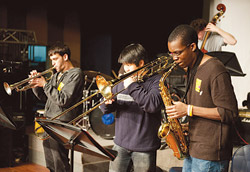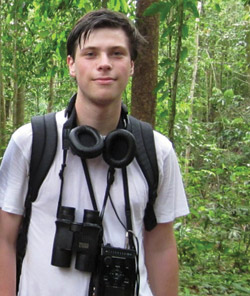Creativity & Leadership
Key components to changing the world

My ultimate goal is to change the face of music in China." This would be an ambitious statement coming from anyone, but coming from Terry Hsieh ’11, a jazz trombone and East Asian studies major, one could be forgiven for being a bit incredulous. But Hsieh is deadly serious about his goal, and he has the experience to back it up. He has completed two tours of China with his band, the Terry Hsieh Collective, which is made up of other Oberlin jazz majors. While on tour, the band dedicated much of its time to educational outreach and performing and teaching master classes in schools across Beijing—and that’s just the beginning. Hsieh is building, piece by piece, an institute in China that will serve two symbiotic purposes: The first is to bring American jazz musicians to China, luring them with the promise of reliable work in the country’s burgeoning jazz scene; the second is to provide high-caliber jazz music to Chinese audiences, who, Hsieh believes, are ready to patronize this music if given the opportunity.
In many ways Hsieh embodies the quintessential Oberlin character: He is driven, and he has ambitious goals and a highly developed set of skills. At another college, his vision of bringing jazz music into China might not have happened as an undergraduate. But at Oberlin, with help from the Creativity & Leadership Project, Hsieh has made two trips to China. Using funds provided by the program, he’s also begun creating his institute from the relative security of life as a student.

CIGSIE award recipient Terry Hsieh (center) was joined on his 2011 tour of China by Julie Chen '10, piano; Alex Cummings '13, saxophone; Brandon Gaoiran '12, double bass; Will Miller '12, trumpet; and Cory Rogers '12, drums. In this photo from his 2010 tour, musicians performing with Hsieh included Gabe Pollack '10 (left) and
Tim Bennett '11 (right).
In a sense, Hsieh is practicing the business of music in the same way that he practices his trombone. Andrea Kalyn, associate dean for academic affairs at the Oberlin Conservatory of Music, says that’s exactly the role that the Creativity & Leadership Project was intended to have. "It’s about imagining how your work lives beyond Oberlin, and what your life as a musician is going to look like," she says. "We provide students with the opportunity to create experiences that will help them refine their ideas about how they’re going to live as professional musicians."
Oberlin started the Creativity & Leadership Project (C&L) in 2007 as a way of encouraging students to put their innovative ideas into practice. From the start, the program emphasized cross-disciplinary projects. Oberlin students often are high achievers in multiple areas of study. The students’ projects reflect this, as with Hsieh’s combined interest in jazz and East Asian studies. The scope of the projects that students propose varies widely—anything from a week-long performance tour of cello works on the East Coast to creating a community radio station in New York.
"It's about imagining
how your work
lives beyond Oberlin,
and what your life
as a musician is
going to look like."
"The program offers stages of funding," says Kalyn. The first tier is the Creativity Fund award, which provides up to $2,000 to students who are experimenting with early-stage ideas. The fund supports students who articulate problems and propose solutions in the form of entrepreneurial ventures. The fund then finances projects to test out these entrepreneurial ideas. Past projects have touched on many areas, from a winter-term tour of Italy by a chamber ensemble to a project on make-up artistry by Alani Gaunt ’10.
This year, the Creativity Fund supported creation of new performance venues and the design of hi-fidelity stereo speaker housing made from environmentally sustainable materials.

Charlie Colwell '13 in Costa Rica
The second stage of funding involves Conservatory Initiative Grants Supporting Imagination and Excellence (CIGSIE). CIGSIE grants, which can be worth up to $6,000, support development of imaginative, artistic projects to be implemented during winter term. Unlike the Creativity Fund, CIGSIE grants are available to conservatory and double-degree students only. In 2011, all three CIGSIE recipients were double-degree students whose projects reflected the convergence of their academic interests and musical backgrounds. Terry Hsieh’s winter-term tour in China was funded by a CIGSIE grant. Charlie Colwell ’13, who majors in cello performance and biology, is another recipient. In a nod to French composer Olivier Messiaen, Colwell traveled to Costa Rica to compose pieces based on bird calls. Jacob Baron ’11 went to New York to take lessons with jazz composer Miles Okazaki. Baron, who studies jazz piano performance and physics, set out to write a composition that combined the principles of quantum mechanics with the idioms of modern jazz.
"The piece itself is based on the uncertainty principle of quantum mechanics," says Baron, "which states that one cannot exactly know both the location and speed of an object at any given instant—the more accurately you know one quantity, the less accurately you know the other. I made an analogy to melody (location) and rhythm (speed). In this composition, the more well-defined the melody, the less defined the rhythm, and vice versa."
The largest awards given by C&L are fellowships worth up to $30,000. The application process is rigorous: fellowship applicants must write a series of specific proposals showing that their proposed entrepreneurial venture meets a demonstrated need and that they have a viable plan for implementation. They must also take a class in entrepreneurship and business basics. In contrast to the CIGSIE grants and Creativity Fund awards, which support projects that are more exploratory in nature, fellowship projects are more defined and developed. Applicants have a clear vision of what their business venture will look like, and know how to implement it. Past winners of this fellowship include Kantara Crafts, a fair-trade business that partners with Moroccan artisan cooperatives to offer handwoven textiles from Morocco in a socially responsible way. Another business, Bread and Butter Silkscreening Studios, is a small collectively owned silkscreening studio in Queens, New York.
Oberlin doesn’t expect students to navigate the complex world of launching a business on their own. All fellowship applicants must take Introduction to Entrepreneurship, which introduces concepts relevant to entrepreneurship and examines case studies, including businesses founded by Oberlin alumni. Other course offerings include grant writing, accounting, and professional development for freelance artists. These classes often feature guest lecturers who are leading members in their field. For instance, this past spring, Marty Ashby, a noted music consultant and producer, gave lectures on the jazz music business and worked one-on-one with students, including Terry Hsieh.
"[Ashby] is giving me informal, personal advice about booking bands and how to solidify my business into something marketable," says Hsieh.
Alumni involvement in C&L is critical. In addition to volunteering time and expertise in the classroom, alumni help students land internships across the country. A collaboration between Oberlin parents Jeanie Schram and Cheryl Finley and alumna Margot Golding ’76, for example, yielded six arts internships, five of which were filled by conservatory students during winter term this year. These hands-on opportunities are precisely what C&L looks to foster, and because Oberlin alumni are involved in many areas of the arts, business, and entrepreneurship, students can easily find mentors. C&L is supported by the Burton D. Morgan Foundation and the Ewing Marion Kauffman Foundation, but alumni contributions are welcome as well.
Hsieh remains as serious and focused as ever, and he is continuing to work toward his goal of growing jazz in China. "I’ve been looking to start branching out into the business of booking jazz musicians in China through my company, Unicorn Jazz," he says. "It’s a process that requires extensive and deep knowledge of the Chinese culture, taste, and psyche. It’s a huge project that’s starting to finally come together."
Will Mason ’10, recently graduated with a double degree in politics and jazz drumming. He will begin work on a doctorate in music theory at Columbia University in the fall.
